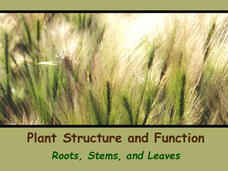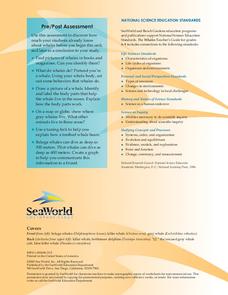Curated OER
Biology: Plants - The Fiber of Life
Young scholars, in groups, examine and list the varieties of plants and how they relate to man and the environment. They create plant books complete with leaf samples with sketches and information, grow beans in plastic baggies, and...
Curated OER
"Tri-County" Project--Water Cycle
Learners analyze the parts of the water cycle through research and experimentation. Particular attention is paid to the processes of evaporation and condensation.
Biology Junction
Plant Structure and Function: Roots, Stems, and Leaves
Scientists found fossils of plants more than 420 million years old—but plants existed for up to 100 million years prior to these fossils. Learn about the importance of plants to the entire planet. Viewing a presentation helps scholars...
Tech Museum of Innovation
Seed Dispersal
Engineering challenges are not just man-made ... nature has its own set of them. A hands-on STEM activity has groups designing a seed dispersal system. Each group can only use one sheet of paper — a tough task!
Starry Night Education
The Stars
Three astronomy activities in one resource! Here you will find one hands-on activity, one demonstration, both with discussion questions, and one activity worksheet. During these lessons young scientists discuss how stars are different,...
NOAA
The Dead Zone
The fifth installment of a 23-part NOAA Enrichment in Marine sciences and Oceanography (NEMO) program defines dead zones and how they form. Pupils then examine data from the Gulf of Mexico to determine dead zone formation.
National Park Service
Weather Patterns of the Pacific Ocean
How do oceans affect weather patterns? Learners define vocabulary associated with dew point, topographical lifting, condensation, and formation of clouds and precipitation as they explore the weather in the Pacific Northwest. They also...
Sea World
Whales
A whale of a lesson is sure to intrigue your elementary oceanographers! Learn about the mammals of the sea with a series of activities about whales, dolphins, and porpoises. Kids complete worksheets about the anatomy of a whale, create a...
Biology Junction
World of Insects: Characteristics, Orders, and Collecting
Every bug is an insect, but not all insects are bugs. A presentation lists the characteristics of insects, describes their body parts, and explains metamorphosis. It also details every order and includes photographs and multiple facts...
Chicago Botanic Garden
Seasons of a Plant
The third in a series of six lessons is an engaging three-part activity defines that discusses phenology, focusing on the cyclic seasons of plants. Pupils then observe phenology outside before determining how climate change can...
Curated OER
The Carbon Cycle
In this carbon cycle worksheet, students will read about the carbon cycle and study a diagram showing what creates carbon dioxide and what uses carbon dioxide. Students will then complete 4 short answer questions.
Curated OER
A Dog's Life
Young scholars get a look into the life of dogs-from their origins and basic biology, through selective breeding, and into how dogs have become intricate parts of everyday life for many people worldwide.
Curated OER
We All Live Together
First graders examine the lifestyle of classroom and family pets in their natural habitat. They determine the needs of plants and animals, and how those needs are met. They listen to read alouds, sing songs, and draw using computer based...
Curated OER
Where are the Dinosaurs?
Students construct their own diorama based on the life of a dinosaur. In this dinosaur lesson, students create models of dinosaurs and dinosaurs' eggs to explore the life cycle of this extinct species.
Virginia Department of Education
Go with the Flow
How does nature's hierarchy relate to our local human environment? Answer this question, along with others, as the class visually depicts the natural hierarchy provided by nature. Pupils discuss each piece of the pyramid and its energy...
Mr. E. Science
Erosion and Deposition
Get an in-depth look into erosion and deposition with a 23-slide presentation that details how gravity, water, waves, wind, and glaciers cause changes to the Earth's surface. Each slide consists of detailed images equipped with labels,...
Curated OER
HABITAT for the other 90%
Learners examine the connection between the habitat needs of endemic species to the habitat needs of humans. In this habitat instructional activity students research the habitat requirements of a given family then develop an idea to...
Curated OER
Wacky Wildlife World
Fourth graders research organisms in the environment in Kentucky and create brochures for the local area wildlife reserves. Individuals create brochures that include information on habitat, body characteristics, scientific class, role...
Curated OER
Science: The Water Cycle
Students examine the various stages of the water cycle. In groups, they complete a hands-on activity by creating model water cycle. Students design posters representing each of the seven stages of the water cycle.
Curated OER
Caterpillars To Butterflies
Students observe the life cycle of a butterfly. They read butterfly/caterpillar themed books. They sequence the lifecycle from eggs on a leaf to an adult butterfly. They release their butterflies into a natural habitat after singing and...
Curated OER
Change or Adaptation
Students identify the adaptive forces in the life cycle of plants, animals, and humans, isolate and identify the role that change and adaptation play in extreme environments and research and write a short term paper using MLA citations.
Curated OER
Gardening with Your Students
By growing a class or school garden you can teach students about the environment, the life cycle of a plant, and healthy eating.
Curated OER
Beaver Ecology
Students investigate beaver adaptations, life cycle, and the effects of beaver behavior on ecosystems. They compare and contrast how beavers influence the ecology of both forest and aquatic ecosystems.
Curated OER
The Queen's Empire
Students conduct Internet research on a variety of ant species and their habitats. They have an opportunity to observe ants in their environment. Areas of interest might include ant identification, colony life, the ant life cycle, and...

























